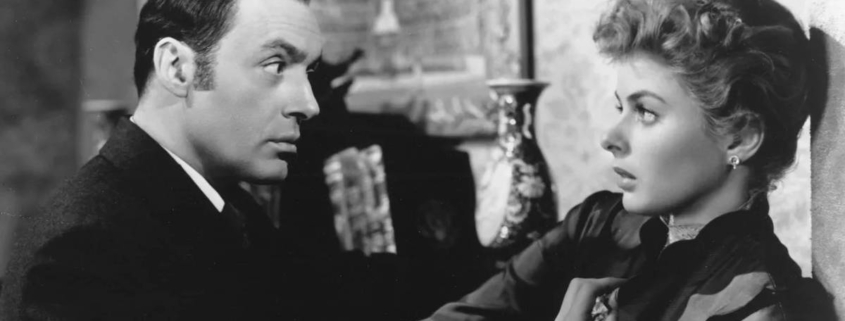Gaslight – A Film Analysis
The secret to discovering a well-disguised tyranny is to understand the mind of a serial predator.
The 1944 psychological thriller Gaslight, directed by George Cukor, is reminiscent of the Hitchcockian thrillers that were very popular during the war and post-war years, though the move itself is not directed by Hitchcock. It is also perhaps one of the finest microcosmic representations of how fear and manipulation can be used to exert power and control.
The film’s protagonist is the orphaned character of Paula Alquist (portrayed by Ingrid Bergman), and the prologue tells of Paula’s traumatic aftermath just after she had witnessed the body of her aunt Alice Alquist, a famous singer, lying motionless underneath an enormous portrait of herself. Paula is escorted out of London to help her start a new life. In the next scene, we learn that she is training to be a singer in Italy.
It is in Italy where Paula meets a man named Gregory Anton (portrayed by Charles Boyer) and falls in love with him, later marrying him. Little does she know that Gregory who exudes politeness and concern at every turn is, in fact, a heavily disturbed individual. Gregory’s behavior is worth observing because he expresses a particular kind of illustrative control that is highly manipulative and sinister.
When Paula thinks of the places where they’d move to begin their new life together, Gregory suggests London. Paula is immediately struck by this suggestion but she agrees. Upon arriving in London, Paula is transfixed at the many reminders of her murdered aunt. To her, the portraits and the furnishings are like skeletons from a violent past; but Paula also somehow knows that these belongings of her aunt are valuable to her.
Gregory, on the other hand, is too anxious to get rid of these reminders while claiming that he does not want his wife’s new life to be haunted by tragedy. It is here where we will observe the cult leader-like nature of Gregory; examining this nature is key to understanding power and control that exists around us on a much bigger scale.
First, we observe that Gregory intends to separate his wife from all reminders of her past, especially those involving her aunt, and by doing so, Gregory effectively hides the event of Alice Alquist’s murder and also the identity of the murderer. A murderer and persecutor is always aware that the past in its completeness convicts the true wrongdoer.
Knowing the past—complete with its glories and tragedies—is essential to a future devoid of delusion. Hiding the past, the tragic murder, however, creates a state of delusion and a steady spiral into madness.
When Paula happens upon a letter—one that was written by a man named Sergis Bauer to her aunt—Gregory is alarmed; he immediately and violently snatches the letter from his wife’s hands. The control, alienation, and isolation start from this point onwards.
The next thing that Gregory does is to take advantage of his wife’s childlike naivety; he starts playing with Paula’s memories. He intentionally misplaces valuable items and convinces Paula that it is she who is misplacing them. Due to this clever tactic, Paula grows increasingly detached and numb.
Notice how this technique of “gaslighting” (a term made famous by this movie) is ever-present in the world around us. Censorship, canceling out the past because it is “problematic” for us, and inducing guilt in the form of false memories are some of the elements that are required for totalitarian control. They are used all the time in our media-driven world.
Gregory Anton’s technique of guilt-inducing is particularly useful for imposing complete isolation on the chosen subject. The subject is declared sick and therefore must be enclosed for her own good. This point is hammered down in a scene where Paula and Gregory attend a concert. During the performance, Gregory tells Paula that he is unable to find his watch and then “discovers” it, much to Paula’s horror, inside her purse. She breaks down and is escorted out in front of a bewildered audience.
It is important to note here that Gregory’s abuse is not undertaken by him alone. Persecution, to be effective, must be carried out by a multitude of actors, which is why Gregory plants seeds of resentment towards Paula among the maidservants of the house while presenting himself as an agent of Paula’s stern and lofty personality.
In one scene, Paula is keen to warm the fireplace by herself but she is reproached by her husband and is instead encouraged to call for the servant. The servant arrives and, upon hearing Paula’s command to put coal in the fireplace, eyes her mistress with a hint of contempt. Meanwhile, Gregory himself cleverly interacts as a person who wishes to bridge the gap between the servant and the mistress.
Gregory’s approach of sowing resentment and envy serves a twofold purpose. First, it would allow him to accomplish his goal unhindered, which we will come to later. Second, it would cement Paula’s alienation and ensure that she wouldn’t receive empathy in her state of detachment. Indeed, when Paula hears footsteps of a mysterious intruder in the middle of the night, her claims are dismissed even by the most upright of her servants as mere imagination.
Envy, resentment, and discord—these are familiar enough words to describe our political and cultural discourse. But Gregory Anton’s approach is one that will be eerily familiar to those who analyze political history. Just as Gregory sows resentment in his household, so do the rulers and influencers of our time. Just as Gregory’s co-conspirators are unconscious in their persecution, so are the vast majority of people around us who rely on the designated priestly media class to instruct and direct them.
Our own participation in the machinations of violence is often overlooked and, instead, we find ourselves directed by fear and envy towards another—one who is innocent. Upon realizing this scapegoat mechanism, our first instinct is to recognize ourselves as the scapegoat, but this is where we must quickly caution ourselves. Paula’s descent into the inferno of self-doubt is not where she redeems herself; she will do that later.
First, we must note Paula’s own failure to escape the mimetic rivalry that is being set up for her. When commanded by her husband to ring for the servant, she begins in earnest by saying, “We should consider them a little.” But she allows herself to succumb to her husband’s intent; and she succumbs because she thinks her husband is incapable of evil. Paula’s gullibility reminds us of ourselves and our blind faith in the tyrannical powers that pit us against each other.
Once we are aligned on the battlefield—once the lines are drawn—the criminal nature of coercive, predatory power swings into action. In Gregory’s case, the object of theft are Alice Alquist’s royal jewels. In the case of predatory, tyrannical power, the object is always our inherent worth as human beings and as icons of the Creator.
In the climactic scenes of the movie, we see an inspector named Brian Cameron (portrayed by Joseph Cotten) seek out Paula and confront her with reality. She isn’t going crazy, Brian assures her, she is completely sane. He reveals to her that he was an admirer of Paula’s aunt and gives her a glove that was gifted to him by Alice Alquist, a valuable piece of the past that would’ve never found its way into Paula’s hands had Gregory’s cancel culture-esque scheme been perfected.
Brian also helps Paula discover the letter that Gregory had snatched and hidden from her; the letter identifies that Gregory is her aunt’s murderer. After a brief struggle, Gregory is apprehended and tied to a chair. In desperation, Gregory demands to see his wife. She agrees.
Paula sees before her the man who’d almost driven her insane. “Take the knife and cut me free,” Gregory tells her in a last-ditch effort of manipulation. Paula takes the knife in her hand and is visibly tempted to punish her husband just as he’d punished her. The viewer here wonders whether she will cut him free or kill him. But Paula pulls away, deciding to let justice takes its course.
Gaslight is a rare film that does not employ the sacrificing of the villain as the narrative’s problem solver. Too many times we see the hero get his revenge on the villain, often in the exact manner as the previous act of violence. But Paula proves herself to be miles apart from other protagonists. The filmmakers maintain the purity of her character while giving the viewer an important lesson that innocence needs not be tainted for justice to prevail.
The key to stopping tyranny is not to mimic its evildoing but to walk away from its contagious grasp. In doing so, it will be rendered obsolete.










Leave a Reply
Want to join the discussion?Feel free to contribute!